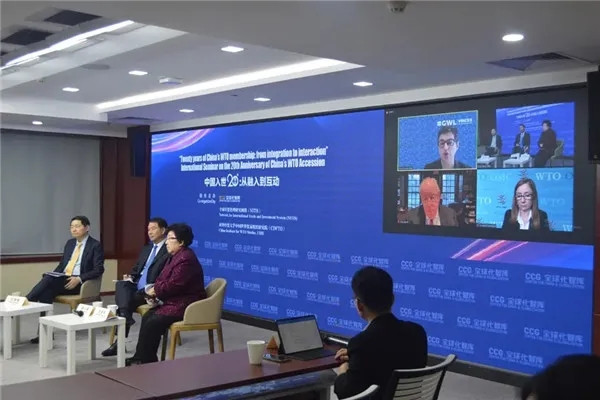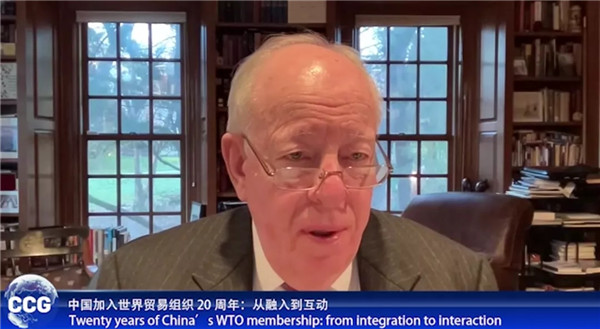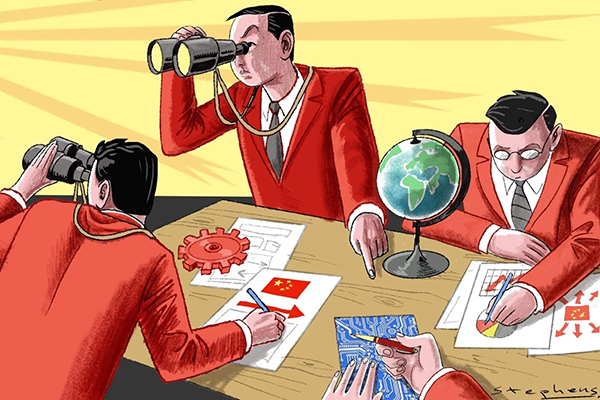Alan Wolff’s Remarks at CCG Seminar on China’s accession to WTO
December 13 , 2021
The year 2021 marks the 20th anniversary of China’s accession to the WTO, an event that has brought about the unprecedented integration of a large transitional economy into the rules-based multilateral trading system. Since its entry, China has benefited significantly and become the largest trader in goods and second largest trader in services in the world today. At the same time, China’s growing involvement also has led to power shifts within the WTO and impacted on the functioning of the WTO.
In order to commemorate this anniversary and exchange intellectual wisdom to better promote China and the WTO’s shared future, Center for China and Globalization (CCG), the Network on International Trade and Investment System (NITIS) and the China Institute for WTO Studies (CIWTO) at the University of International Business and Economics (UIBE) co-hosted a hybrid discussion on December 13, 2021. This event was moderated by Wang Huiyao, CCG President and Counselor to the State Council of China. Speakers included Anabel Gonzalez, Deputy Director-General of WTO; Arancha Gonzalez Laya, former Foreign Minister of Spain; Tu Xinquan, Executive Dean and Professor, the China Institute for WTO Studies at UIBE; Alan Wolff, Distinguished Visiting Fellow at Peterson Institute for International Economics (PIIE) and former Deputy Director-General of WTO; YI Xiaozhun, former Deputy Director-General of WTO; ZHANG Yuejiao, Dean of Institute for International Dispute Settlement, Tsinghua University and former Chairperson of WTO Appellate Body.
A special address was made by Alan Wolff, Distinguished Visiting Fellow at Peterson Institute for International Economics (PIIE), former Deputy Director-General of WTO.

Arguably the single most important action taken by the World Trade Organization (WTO) in its 26-year history was the admission of China on December 13, 2001.
Joining the WTO accelerated the process of internal economic reform in China.i With the reforms, China attracted substantial domestic and foreign investment and expanded its international trade dramatically. Trade remains vitally important to China’s economy, to its people’s well-being, and to its future.
While all 164 members of the WTO have benefited substantially from progressive trade liberalization and expansion of the rules for global trade, China has been second to none as a beneficiary of the multilateral trading system during these last 20 years. With hard work and concerted effort, and the integration of China into the world economy, hundreds of millions of Chinese were brought out of poverty. The lives of China’s people were greatly improved.
This is not the end of history. It is an unfinished story. The expectation of China’s trading partners in 2001 was China would continue its integration with other economies. The purpose of the WTO is a shared commitment to ever greater openness of trade on fair terms, free of distortions. It is about convergence based on this ideal.
By joining the WTO, China pledged that commercial enterprises, whether or not state?owned, must act solely based on commercial considerations, buying and selling decisions free from government interference or influence. This market-oriented behavior is expected of all WTO Members. The WTO rules should make this basic tenet explicit.
China has said that in any new trade agreement it will take on responsibilities in line with its capacity. This is a praiseworthy commitment. Acting in accordance with it will increase trust in the trading system.
The WTO was not designed to be static, and indeed would be seriously damaged if it does not continue to make progress. The G20 leaders have repeatedly called for WTO reform. As the world’s second largest economy and largest exporter of goods, China has the resources to take a positive leadership role, in tandem with others, to bring about necessary reforms. China should be expected to do so.
What reforms are necessary? Serious negotiations are needed: (1) to yield new agreements liberalizing trade further and extending the rules of the system, (2) to restore dispute settlement seen as legitimate by all, and (3) to develop the WTO as an institution with an Executive Secretariat to be a more effective administrator of the trading system.
A necessary early topic for expansion of the scope of the system’s rules is the crafting of disciplines over industrial subsidies. The Global Trade Alert informs us that the problem is expanding rapidly. Subsidies are another form of government influence that distort trade and must be dealt with. It is unlikely that dispute settlement reform can be achieved without improving the WTO’s substantive rules.
Failure to address this subject will result in continuing trade conflicts. China will be both the recipient of complaints and the complainant with respect to the conduct of others. Areas of potential conflict should be reduced by providing clear international disciplines on both industrial and agricultural subsidies.
One month ago, speaking at the China International Import Expo in Shanghai, President Xi Jinping said that that China is open to negotiations on industrial subsidies and state-owned enterprises in order to be accepted into the Comprehensive and Progressive Agreement for Trans-Pacific Partnership. These issues should be resolved on a multilateral basis in the WTO as well.
China has been in the forefront of the “joint statement initiatives”, open plurilateral negotiations, at the WTO. China should join with other participants to assure that the outcomes of these negotiations are included formally as part of the WTO’s fully acknowledged agreements. The recently concluded negotiations domestic regulation of services provides a timely practical opportunity to do so. Formally incorporating the expected Investment Facilitation Agreement into the WTO’s body of agreements should occur as well.
Trade was and is essential to deal with COVID-19 and future pandemics. China’s productive resources, through trade, have helped the peoples of the world to meet the current challenge. The WTO’s members have yet to act collectively to set the rules by which this and future pandemics can be dealt with more effectively. It is imperative that it do so.
China can also make an important contribution by joining the Pharmaceutical Agreement which provides duty-free trade in medicines and by updating its product coverage, and by calling for the Information Technology Agreement to be updated, including covering pandemic-relevant IT products.
Trade will play an essential role in dealing with climate change, bringing foodstuffs from areas of plenty to areas in need, and bringing environmental goods from distant factories to places where they must be deployed. Chinese officials have suggested that the Environmental Goods Agreement negotiations should be revived. Other countries should take China up on this offer. Carbon border adjustment mechanisms should also be the subject of multilaterally agreed approaches if trade conflicts are to be avoided.
China is an essential party to each of these subjects for negotiations.
Beyond the shared challenges of global health and climate, geopolitical and other strains in international relations can easily threaten trade, causing it to be weaponized. Active management is required. The multilateral trading system was founded in the middle of the last century to underwrite and sustain peace. The WTO can and should play a positive role in achieving this objective in the face of current challenges.
China should move to a more active role in making the WTO succeed. It should join with the United States, the European Union, and Japan, with a few like-minded countries, to preserve and improve the WTO, by leading the reform effort.
Under the GATT and WTO, the economies of the world have become increasingly interdependent. This should be a cause for celebration and not fear. Strenuous efforts will be needed to keep global economic integration as a positive development, bringing about shared economic growth, and sustaining peaceful relations.
The world today is vastly different than the world of twenty years ago. The WTO is in crisis. It is not in China’s interest to see it fail. The key anniversary for China in the WTO is not this one, but the 25th, looking back at what China has done to sustain the multilateral trading system during these next five years.
At events marking China in the WTO at 25, those speaking on panels like this one will be able to evaluate what President Xi Jinping foreshadowed when he said at the Shanghai Expo —
“We support the WTO reform in moving in the right direction, and support the inclusive development of the multilateral trading regime, as well as the legitimate rights and interests of the developing members,”
“We will not change our resolve to open wider at a high standard; we will not change our determination to share development opportunities with the rest of the world; and we will not change our commitment to an economic globalization that is more open, inclusive, balanced and beneficial for all.”
From PIIE, 2021-12-13
Topical News See more






